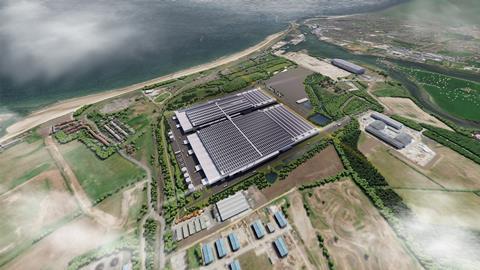Could be a year before work re-starts
An Australian battery firm has confirmed its takeover of Britishvolt, reviving hopes that construction of the latter’s £3.8bn gigafactory in Northumberland might be continued.
Contractor ISG, which paused work on the Blyth site last August, said earlier this month that it was “ready, willing and able” to re-start the job, as news of Recharge Industries’ take-over plans emerged.

Britishvolt’s administrators EY announced this morning that they had completed the sale of the firm, which went into administration last month after running out of cash, to Recharge, a start-up owned and run by New York-based investment fund Scale Facilitation.
In a statement, the administrators said the remaining Britishvolt employees had transferred to Recharge as part of the transaction, the value of which remains undisclosed.
“The sale of the business will help to support the development of technology and infrastructure needed for the UK’s energy transition,” it said.
Scale Facilitation chief executive David Collard told the BBC that the Blyth site was “shovel ready” but that it would take six to 12 months before construction work would begin anew.
The factory had been a flagship project for Boris Johnson’s levelling up policy and the government had committed £100m to Britishvolt if certain construction milestones were hit.
The 95ha site is understood to be an ideal location for a battery factory due to its size, transport links, deep seaport and access to clean energy.
ISG’s future involvement with the scheme is unclear. Building understands the firm’s pre-construction services agreement ended at the end of last year and that the firm had been paid fully for its work up to the stoppage.
Speaking earlier this month, after Recharge was named preferred bidder, construction lawyer John Wallace told Building it was “unlikely” that Recharge would choose a third-party contractor, “because ISG knows the site, have started work and bringing on a new contractor is always expensive”.
Wallace, a director at law firm Ridgemont, speculated that ISG would be in a “strong position” as it will have bargaining power knowing that Recharge will likely want them to continue.


























No comments yet